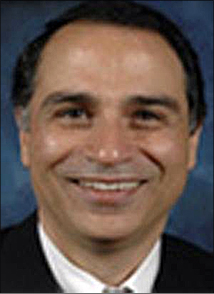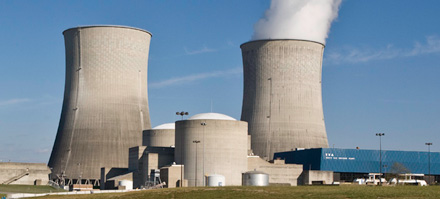
September 13-2013
Masoud Bajestani, the Iranian-American who was once in charge of building the only nuclear power plant now under construction in the United States, pleaded guilty last Wednesday to violating US sanctions by investing money in Iran and to lying on his income tax returns to cover up those investments.
Bajestani, 58, said his savings were earning little money in the United States with interest rates so low in recent years that he decided to send some of his money to Iran to earn a better return. That violated the 1995 sanctions imposed by President Bill Clinton that bar American residents from investing in Iran.
Bajestani agreed to forfeit $600,000, the sum he sent to Iran between February 2008 and May 2010.
He is due to be sentenced in January and faces five years in prison for the sanctions violation and three years for each of the two years of false income tax returns he filed as well as a fine of up to $250,000 on each count.
The false income tax return charges stemmed from his checking of a box in two successive years that said he had no funds in foreign bank accounts.
Bajestani had been a vice president of the Tennessee Valley Authority (TVA), the huge federal

agency that produces electricity in Tennessee and Alabama.
Bajestani was indicted in February. Prosecutors wanted him jailed then because they feared he would flee to Iran where he has relatives, including his father, lots of money and would be in high demand because of his knowledge of building nuclear power plants. But his defense attorney pointed out that Bajestani had known he was under investigation for two years and had never tried to flee.
A federal judge released him into his daughter’s custody but imposed stiff requirements. Bajestani had to wear an electronic monitor, relinquish his American and Iranian passports, deposit $1 million in an account controlled by the court and turn over the deeds for the two homes he owns in Tennessee, all of which would have been forfeited if he had fled.
Bajestani was the official in charge of TVA’s $2.5 billion Watts Bar #2 Nuclear Power Plant construction project until he was fired in January 2011. That dismissal came after Bajestani admitted he withdrew $1.5 million from his deferred compensation account with TVA in 2007 by claiming a financial hardship that didn’t exist.
The Chattanooga Times Free Press reported that an appellate court ruled in 2010 that Bajestani falsely claimed to need the money for housing when he actually sent $600,000 to his brother-in-law in Iran. The transfers were made through a Canadian bank just after Bajestani’s second wife, Maryam Ghorashi-Bajestani, sued him for divorce.
“[Bajestani] did not need the money,” Tennessee Court of Appeals Judge D. Michael Swiney wrote in a 31-page divorce ruling last year. “At trial, he admitted that he did not have a financial hardship at the time he made the withdrawal.”
That divorce proceeding exposed his financial dealings and brought the federal government in to investigate.
Bajestani testified he wanted to earn more money through investments in Iran. “The dollar was losing its value, and I had this opportunity to invest some money outside the US and specifically buy some property back in Tehran, Iran,” Bajestani said during his divorce trial in 2008. “So I decided to withdraw the money and invest it outside the US.”
By withdrawing the money early under false pretenses, Bajestani appears to have violated TVA’s rules for such bonus and retirement plans, the Chattanooga daily said, thus getting himself fired.
It appeared to the court that Bajestani was trying to move money out of the country so it wouldn’t be calculated in any divorce settlement.
Bajestani was being paid more than $600,000 a year as a vice president of the TVA.
Bajestani had been vice president in charge of all three of TVA’s nuclear plants at one time or another. He became embroiled in another court case shortly after taking on oversight of building the Watts Bar’s #1 reactor two decades ago.
The Tennessean of Nashville, Tennessee, reported that he fired Robert Klock, a lead startup engineer on the first Watts Bar reactor, on July 5, 1994, saying Klock had been absent from work, was not needed anymore and had used unauthorized overtime. The US Department of Labor found otherwise.
The plant was preparing to begin operation, and Klock, who worked for a contractor, had found safety issues, according to documents from the department’s case.
Klock had informed TVA officials about his concerns but was brushed aside, The Tennessean said.
When Klock told Nuclear Regulatory Commission staff, however, they confirmed he was right. He was fired within a few weeks, after leaving on vacation to take his son to Disney World.
On direct examination, Bajestani had testified that he didn’t know that Klock had raised any concerns with the NRC, but Bajestani had gone on an inspection tour led by Klock to show the NRC the valve in question.
Bajestani also admitted later on cross-examination that he knew Klock had told the NRC about the valve issue.
The investigation by the Labor Department determined that Klock had been discriminated against for reporting safety concerns to regulators.
TVA was ordered to repay wages lost as well as to compensate for other losses that resulted.
Without income, Klock, who had been going through a divorce, had his home foreclosed on and had to give up his car. He couldn’t get a job in the nuclear industry with the cloud left over him by the firing, The Tennessean said.
The loss of Klock’s job “was a deliberate retaliation” for his discussing the items with nuclear regulatory staff on site, said an administrative law judge in September 1995.
“He has shown by the clear preponderance of the evidence that those reasons, as enumerated by Bajestani, did not actually motivate his discharge,” it said.
Testimony was given that Klock was highly regarded for his dedication, hard work and knowledge and that his reports to the NRC had embarrassed TVA officials.
Klock told The Tennessean in January 2011 that Bajestani was arrogant and short-tempered. “It was egg on his face,” Klock said. “I had been working there 16 months. He fired me for absenteeism. I actually worked an average of 66 hours a week.”
The valve in question was on the radiation containment vessel of the reactor. In the event of a shutdown, it could keep high-level radiation from getting to employees and the public.
Bajestani had said it should be bypassed if it didn’t work, Klock said. “When I did the final review, I said, ‘This isn’t right.’”
Klock said he wasn’t bitter toward TVA. “It wasn’t TVA,” he said. “It was him [Bajestani]. It was him alone.”
